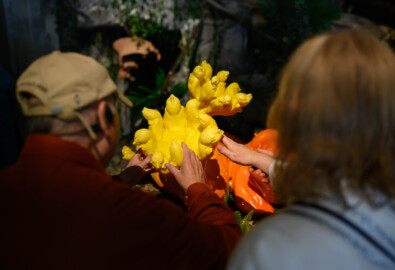
Initiative just one of a host of measures festival will undertake in 2025 to drive to a sustainable future
Galway International Arts Festival is delighted to announce that it is to become a Climate Transition Laboratory during this year’s festival, which takes place from 14-27 July.
Part of a European research project, PACESETTERS, the Climate Transition Lab is a temporary set-up that will experiment with different scenarios for the future of large-scale events, their various carbon footprints and the potential of business models for a low-carbon, regenerative entertainment industry. The laboratory will be supported by co-research teams who have already investigated related case studies.
PACESETTERS is a research project that brings together partners and places, creative practice and research perspectives that are out of the ordinary: climate scientists and artistic entrepreneurs, difficult heritages and whitewashed villages, psychometrically validated surveys and circular aesthetics. There are 15 collaborators on the project spread across Europe, one of whom is GIAF Education Partner, University of Galway. All partners share the confidence needed, not just to adapt to but drive the transition into more just and sustainable economies. They came together in the conviction that innovation mainly happens where it is least expected - for example, in cultural institutions that are well-anchored locally even if they aren’t globally branded.
Galway International Arts Festival’s 2025 exhibit Funeral for Ashes, which takes place at the Festival Printworks Gallery, will form the case-study for the laboratory.
An immersive, interactive experience honouring our Irish ash woodlands, which are now faced with the risk of extinction, Funeral for Ashes is a contemplative installation, featuring 3D scans of Irish ash trees and their surrounding habitats.
Projected across the walls and floor, the piece fully surrounds viewers, plunging them into a poignant, meditative landscape. Generative music and visuals respond in real time to both ecological data and the physical movement of the audience.
The audience are invited to come together in this act of reverence that is aimed as a farewell, a celebration, and a heartfelt tribute to our native ecosystem.
Working with PACESETTERS, GIAF will this year also begin a process of measuring the carbon footprint of the festival, a process that is expected to take three years. As part of these plans, in 2025, GIAF will forensically measure the carbon footprint of Funeral for Ashes, with the ambition of creating a template for the future analysis of exhibitions and events’ carbon footprint at the festival.
The lab will be officially inaugurated at the festival on Tuesday, 15 July with Dr Cissie Fu, a political theorist and co-founder of the Political Arts Initiative, which is interested in the ways in which people interact and compose political ideas and actions through technology and the arts giving a Masterclass to participants from local cultural organisations and GIAF’s artist development programmes, VISTA and SELECTED.
Funeral for Ashes’ creators John Conneely and Conor Maloney will also speak at the event, where they will speak about the project’s ambitions to establish whether the exhibit can influence people’s attitudes to bio-diversity loss.
As part of this year’s First Thought Talks programme, GIAF will also host a talk on climate transition, Where Are We Now?, featuring Prof. Annela Anger-Kraavi, who leads the Climate Change Policy Group at the University of Cambridge, in Bailey Allen Hall in the University of Galway.
GIAF 2025 also features the Irish premiere of Les Compagnies Focus & Chaliwaté’s Dimanche, which looks at climate change via a tender portrait of humanity surprised by the uncontrollable forces of nature.
To continue to transition the Festival to a sustainable future, in 2025 Galway International Arts Festival will:
- Promote the use of public transport and active travel;
- Continue to source energy from renewable sources to meet its commitment to sourcing 50% of its total energy requirements from renewable resources by 2025;
- Will continue to develop GIAF’s ‘Green Ambassadors’ programme to promote sustainability at the festival;
- Will continue to have a strong focus on recycling, especially in the Festival Garden and the Heineken Big Top, where a single-use plastic ban will again be in operation;
- Will see the continuation of the reusable cup scheme in both the Festival Garden and the Heineken Big Top;
- Will reuse of materials in temporary venue builds, installations and theatre sets to support the circular economy;
- Will see further reductions in current waste production;
- Will see further reductions in printing outputs;
- Will continue promotion of behaviours among staff, volunteers, artists and audiences that will help reduce their impact on the environment;
- Continue collaborations with its supply chains to help deliver more sustainable options.
GIAF’s major sustainability initiatives are made possible by the continued support of its major funding and sponsorship partners The Arts Council, Fáilte Ireland, Galway City Council, University of Galway and Heineken®.

